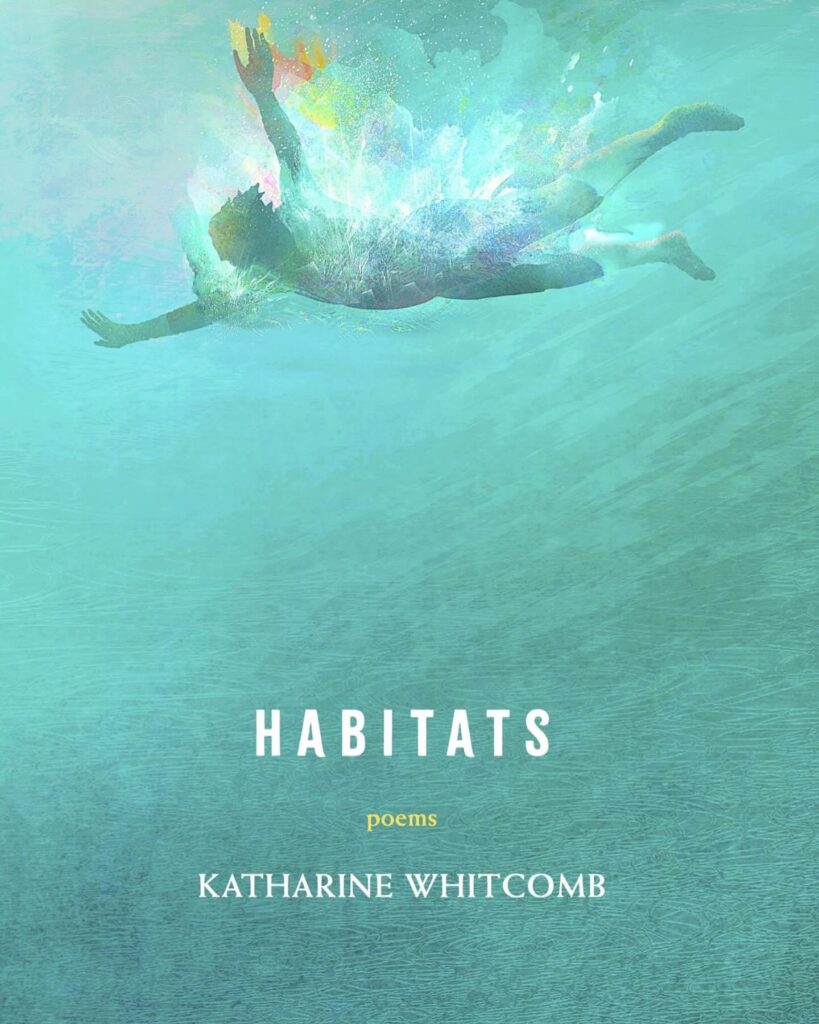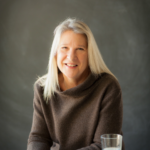Poet Katharine Whitcomb is chatting with me today about her new full-length poetry collection, Habitats.

Bio:
Katharine Whitcomb is the author of three full-length collections of poetry, including Habitats, published in January 2024 by Poetry NW Editions in the Possession Sound Series, Saints of South Dakota & Other Poems, which won the Bluestem Award, chosen by Lucia Perillo, and The Daughter’s Almanac, which won the Backwaters Prize, chosen by Patricia Smith. She has published two poetry chapbooks and co-authored a book of faux self-help/art criticism, titled The Art Courage Program. She was a Stegner Fellow in Poetry at Stanford University and is the recipient of fellowships in the U.S. and Europe from the Wisconsin Institute for Creative Writing, the Fine Arts Work Center in Provincetown, MacDowell, Yaddo, Virginia Center for Creative Arts, The Marble House Project, the AWP Poetry Fellowship to the Prague Summer Seminars, and elsewhere. Her work has been awarded the Grolier Poetry Prize, a Loft-McKnight Award, and the Nebraska Review Award in Poetry. Her poems and prose have been published in The Paris Review, The Yale Review, Bennington Review, Tupelo Quarterly, Narrative, Alaska Quarterly Review, Mississippi Review, The Missouri Review, New England Review, terrain.org, and many other journals and anthologies, and has been translated into Spanish and Hungarian. She is a Distinguished Professor at Central Washington University and makes her home in northern Vermont.
Welcome, Katharine. What do you enjoy most about writing poems?
I love discovering what’s in my subconscious and I love the regenerative process of creating.
Can you give us a little insight into a few of your poems – perhaps a couple of your favorites?
My new poetry collection, Habitats, is divided into three sections: Forest, Hotels, and Dreams—three habitats or places we live and grow. The poet Arthur Sze endorses the book with “Through these lyrically precise, formally adept poems, Katharine Whitcomb journeys and earns a singular vision, where a cypher becomes a threshold to discovery, and any truly live moment uncovers an unforgettable world. The poems seek to explore how searching for beauty, for meaning, for collective intensity of feeling, leads us through experience to belonging to ourselves.
In the opening poem to the book, in the Forest section, the poem “Sleepless Ode” summons up a memory from the speaker’s past “ . . . & I just want to sit outside/ in an old wild empty place/ wrapped in yr coat—as poor/ as we were poor then but there/ w/ everything growing together awake/ & away from death all the livelong night.”
The poems in the Hotels section explores the speaker’s search for belonging. The poem, “Hotel Vienna,” evokes visions of that city through the speaker’s imaginative leaps: “now that no one loves me angels sleep/ on worn velvet sofas in Café Hawelka/ while coffee passes hand to hand above their heads.”
What form are you inspired to write in the most? Why?
I believe fully in allowing the writing to find its form. Some poems gain intensity and meaning through a repetitive form like a villanelle or a pantoum. Sometimes a poem’s weight is perfect for the rush of expression and ending transformative image of a haibun. I like to play with white space and staggered lines to bring attention to the integrity of each individual line and to allow the lines room to resonate. I loved what developed in the poem, “Sestina of Human Longing” in Habitats.
What type of project are you working on next?
I’m working on a new collection of nature-based poems, some of them embodied in a abecedarian ars poetica form I devised.

I’m also redrafting a novel based in Hungary, part romantic abandonment narrative/ part anti-fascist political commentary.
When did you first consider yourself a writer / poet?
When I was a teenager! I have always been completely captivated by poetry.
How do you research markets for your work, perhaps as some advice for not-yet-published poets?
I pay a lot of attention to journals where I see work published that I like and admire. I use Duotrope to keep tabs on my submissions and to get ideas. I follow a lot of writers, literary organizations, and literary journals on social media and note where there are opportunities for submission. I have learned over time to revisit editors who have published my work in the past or have been encouraging. My most salient advice is to submit only to journals that you would be proud to have your work in and above all, to be persistent. Persistence is really the key and keep writing!
What would you say is your interesting writing quirk?
Remembering a little weird thing I noticed or that happened or that I read about (like in the same day I read an article about the discovery of a plant that was thought extinct and the name of the pub that Shakespeare frequented) and obsessing about them until I write a poem.
As a child, what did you want to be when you grew up?
A veterinarian.
Anything additional you want to share with the readers?
There’s nothing better than writing a new poem. That feeling of discovery and joy keeps me going.
Links:
Website | Facebook | Instagram | Twitter | SubStack | BookShop
